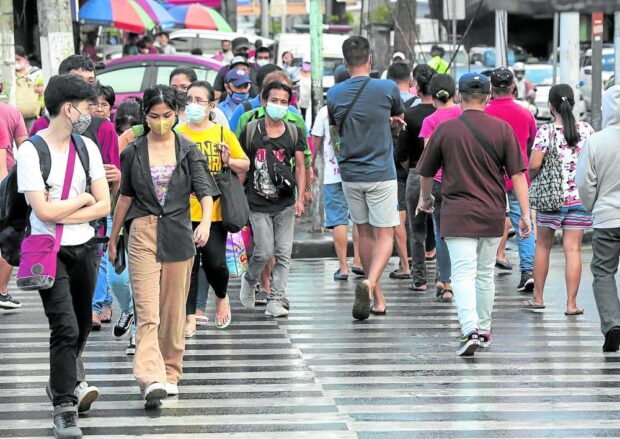COVID cases still rising but alerts may be lowered – DOH

VIRUS STILL HERE | Pedestrians, many of them wearing face masks, cross Kamuning Road in Quezon City in this photo taken in September 2022. Metro Manila has seen an increase in COVID-19 cases, with its positivity rate breaching the 5-percent threshold set by the World Health Organization. (File photo by GRIG C. MONTEGRANDE / Philippine Daily Inquirer)
MANILA, Philippines — Confirmed COVID-19 cases nationwide continued to go up as the Department of Health (DOH) reported on Monday that last week’s average daily new infections increased by 32 percent, reaching 450 cases compared to 341 in the previous week.
Of the 3,148 people who tested positive for the virus based on laboratory swab tests last week, 14 were either seriously or critically ill.
As of Monday, there were 345 COVID-19 patients in serious or critical condition out of a total of 3,255 admitted to hospitals. Those confined accounted for 75 percent of the 4,336 individuals who had been reported to the DOH as still infected with the virus as of April 23.
But even as confirmed cases continued to climb, the utilization of reserved COVID-19 hospital beds remained below the 20 percent low risk threshold.
The DOH reported that 13.7 percent of COVID-19 intensive care unit (ICU) beds and 17.4 percent of non-ICU beds were occupied.
Article continues after this advertisementThe official death toll, on the other hand, rose to 66,444 as the DOH confirmed that five more deaths in 2021 and 2020 were due to COVID-19.
Article continues after this advertisementVax coverage
As for the 26 provinces placed by the Inter-Agency Task Force for the Management of Emerging Infectious Diseases (IATF) under alert level 2 until the end of the month, the DOH said these could be downgraded to alert level 1, the lowest and least restrictive in a five-tier alert category, once they meet the 70 percent vaccination coverage. The remaining 56 other provinces are under alert level 1.
“While these [26 provinces] have reached low risk classifications for cases and utilization rates, [they] have vaccination rates lower than 70 percent of the target total population and/or 70 percent of the total (priority) A2 population among the elderly,” the DOH added. “Meeting these (vaccination) targets will allow these areas to be de-escalated to alert level 1.”
According to the department, the IATF merely maintained the alert level 2 status of the 26 provinces that had been in effect since June last year.“No province or city has been escalated to alert level 2 from alert level 1 since January [this year],” it said.
The 26 provinces are Benguet, Ifugao, Quezon, Palawan, Camarines Norte, Masbate, Antique, Negros Occidental, Bohol, Cebu, Negros Oriental, Leyte, Western Samar, Lanao del Norte, Davao de Oro, Davao del Norte, Davao del Sur, Davao Occidental, North Cotabato, Sarangani, Sultan Kudarat, Dinagat Islands, Basilan, Maguindanao, Sulu and Tawi-Tawi.
Karen Lonogan, head of the DOH Cordillera’s regional surveillance and statistics cluster, said that Benguet (except for Baguio City and Buguias, Sablan and Tublay towns) and Ifugao (with the exception of Alfonso Lista, Kiangan, Lagawe and Lamut towns) have been under alert level 2 since last year because of their low vaccination rates.
As of April 23, only 66.86 percent of Ifugao’s target general population and 71.30 percent of its senior citizen population target were inoculated, she told the Inquirer in a phone interview. In Benguet, those vaccinated accounted for 73.53 percent of its general population and 61.01 percent of its elderly population target.
In Masbate province, health and disaster response officials were strictly monitoring 15 of 21 localities following the alert level 2 classification.
“We have a low vaccination rate because people tend to believe in the fake news spreading online about the supposed ill-effects of getting vaccinated against COVID-19,” said Adonis Dilao, provincial disaster risk reduction and management officer.
Dilao said Masbate recorded only a 62-percent vaccination rate out of its over 900,000 target population.
In Camarines Norte, Dr. Arnel Francisco, chief of the provincial health office, said the province had just a 75.9-percent vaccination rate for senior citizens despite the continuous campaign launched by different towns.
Cebu Gov. Gwendolyn Garcia, meanwhile, expressed dismay over the latest DOH announcement, saying some areas in the province were already under alert level 1, and yet the department placed the entire island under alert level 2.